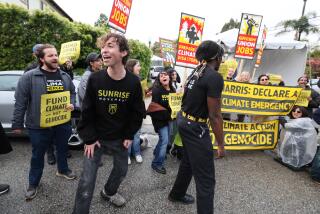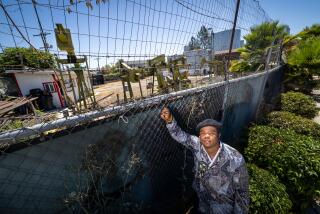Activist Keeps On Marching
- Share via
When his friends gathered in Ojai recently to remember John Bogner, they couldn’t quite believe he was dead.
At 53, he was tanned and taut.
He was a strict vegetarian and drank water by the gallon.
He bicycled all the time. In 1988, he renounced automobiles and gave up his old pickup truck--a polluter, a gas-guzzler, a wasteful hunk of American enterprise. On his bike, he shuttled between Boulder, Colo., where he spent the summers, and Ojai, where he put in for the winter. He crisscrossed the United States, usually with groups making a point about peace, justice, the environment.
Along the way, he stayed with friends and worked odd jobs: A co-op kitchen in Arcata. An alternative press in San Diego. A garden at a place in the desert devoted to the teachings of Gandhi.
He slept on more living room couches than most men his age, but friends say he was the picture of middle-aged vitality, minus the personal trainer.
“He was exactly the opposite of me,” said Coleen Ashly. “I smoke, I drink, I eat sugar, I eat red meat, I do all these things that are supposed to be horrible for you. He was always nagging me, telling me how I was going to die.”
In early May, Bogner’s body was discovered in his tent by a hiker 50 miles east of Palm Springs. He died in his sleep from a heart ailment he never knew he had.
He was on his way to Boulder for the summer.
It was the end of a long road.
In 1986, Bogner was trimming trees in Orange County when he hung up his chain saw.
At the time, plans were being laid for the Great Peace March. Five thousand hikers were to start in Los Angeles, spreading the antinuclear gospel and picking up converts as they strode east. The march was to climax nine months later in Washington, D.C., with 1 million activists demanding unconditional disarmament.
“I have an instinctive feeling that this is going to be the happening happening of the 20th century,” Bogner told a reporter at the time. “I think it’s going to be the thing that starts the snowball rolling, a chain reaction that brings people together.”
That’s not exactly how it worked out. Ultimately, a ragtag army of some 500 idealists, anarchists, ardent retirees and more than 100 children straggled into Washington. Walking 15 miles a day for nearly a year, they had picked up roadside litter, which Bogner sorted and hauled to the nearest recycling centers.
The experience didn’t change the world, but it changed Bogner.
The next year, he joined a group marching for peace from Moscow to Leningrad.
The year after that, he worked with Ashly--one of the leaders of the Great Peace March--on a smaller version through California.
Later he would pedal across the United States with Bike Aid, a group whose riders stop to do service projects in towns scattered along their cross-country route.
And then he would do it again.
It was to the home of Coleen and Dennis Ashly that Bogner would return every winter. She works with the deaf and he tunes pianos, and they organize a Great Peace March reunion in Carpinteria every September. Bogner would stay in the backyard in a battered trailer that had done duty as the march’s transportation office.
“He fell in love with Ojai just like we did,” Coleen Ashly said. “Every time he’d come back, he’d talk about settling down here and planting some roots. He was always saying this would be his home.”
Four years ago, he found the grown daughter that one of his ex-wives had given up for adoption as a newborn. They were fond of each other--he even attended her wedding--but his wandering days hadn’t yet drawn to a close.
After awhile in the Ashlys’ trailer, the barking dogs would get to him, and the fumes from the gas station next door. And he knew these people up on Mt. Palomar, and there were his old friends from Alcoholics Anonymous in Costa Mesa--Bogner had been sober exactly 25 years--and the peace center in Hemet probably needed their trees trimmed again.
And so he would go.
“After that first march, he never did stop marching,” said Coleen Ashly.
Steve Chawkins is a Times staff writer. His e-mail address is steve.chawkins@latimes.com.
More to Read
Sign up for Essential California
The most important California stories and recommendations in your inbox every morning.
You may occasionally receive promotional content from the Los Angeles Times.














